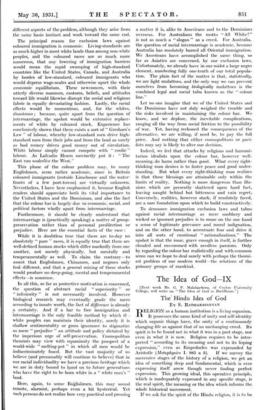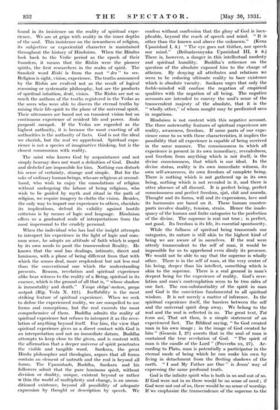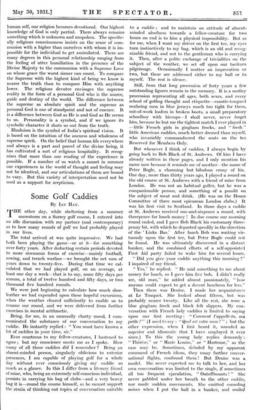The Idea of God—IX
[Next week Mr. G. P. MalalasPkera, of Ceylon University College, will write on " The Idea of God in Buddhism."]
The' Hindu Idea of God
EY S. RADHAKRISHNTAN If we ask for the spirit of the Hindu religion, it is to be found in its insistence on the reality of spiritual expe- rience. We are at grips with reality in the inner depths of the soul. This insistence on the inwardness of religion, its subjective or experiential character is maintained throughout the history of Hinduism. When the Hindus look back to the Vedic period as the epoch of their founders, it means that the Rishis were the pioneer spirits, the first researchers in the realm of spirit. The Sanskrit word Rishi is from the root " drs" to see. Religion is sight, vision, experience. The truths announced by the Rishis are evolved not as the result of logical reasoning or systematic philosophy, but are the products of spiritual intuition, drsti, vision. The Rishis are not so much the authors of the truths registered in the Vedas as the seers who were able to discern the eternal truths by raising their life-spirit to the plane of the universal spirit. Their utterances are based not on transient vision but on continuous experience of resident life and power. Sada pasyanti surayah. If the Vedas are regarded as the highest authority, it is because the most exacting of all authorities is the authority of facts. God is not the ideal we cherish, but the real we apprehend. Spiritual expe- rience is not a species of imaginative thinking, but is the closest communion with reality.
The saint who knows God by acquaintance and not simply hearsay does not want a definition of God. Doubt and disbelief are impossible for him. Nothing can disturb his sense of certainty, strange and simple. But for the sake of ordinary human beings, who are religious at second- hand, who wish to enjoy the consolations of religion without undergoing the labour of being religious, who wish to lie guided by myth and ritual in the path of religion, we require imagery to clothe the vision. Besides, the only way to impart our experience to others, elucidate its implications, defend its validity against hostile criticism is by means of logic and language. Hinduism offers us a graduated scale of interpretations from the most impersonal to the crudely personal.
When the individual who has had the insight attempts to interpret his experience in the light of logic and com- mon sense, he adopts an attitude of faith which is urged by its own needs to posit the transcendent Reality. He knows that the soul has dealings, intimate, direct and luminous, with a plane of being different from that with which the senses deal, more resplendent but not less real than the conventional one which the understanding presents. Reason, revelation and spiritual experience alike bear witness to the reality of a Being, spiritual in its essence, which is the ground of all that is, " whose shadow is immortality and death." Yasya chaya'-mrtam, yasya mrtyuh (Rig. Veda X. 121). Ineffability is the most striking feature of spiritual experience. When we seek to define the experienced reality, we are compelled to use forms and conceptions, but the real exceeds the most comprehensive of them. Buddha admits the reality of spiritual experience but refuses to interpret it as the reve- lation of anything beyond itself. For him, the view that spiritual experience gives us a direct contact with God is an interpretation and not an immediate datum. Buddha attempts to keep close to the given, and is content with the affirmation that a deeper universe of spirit penetrates the visible and tangible word. Sankara, the great Hindu philosopher and theologian, argues that all forms contain an element of untruth and the real is beyond all forms. The Upanishads, Buddha, Sankara and his followers admit that the pure luminous spirit, without division or duality, unique, existent beyond or rather within the world of multiplicity and change, is an uncon- ditioned existence, beyond all possibility . of adequate expression by thought or description by speech. We confess without confession that the glory of God is inex- plicable, beyond the reach of speech and mind. " It is other than the known and above the unknown." (Kena Upanishad I, 3.) " The eye goes not thither, nor speech nor mind." (Brihadaranyaka Upanishad III, 8 8.) There is, however, a danger in this intellectual modesty and . spiritual humility. Buddha's reticence on the question of the absolute exposed him to the charge of atheism. By denying all attributes and relations we seem, to be reducing ultimate reality to bare existence which is, absolute vacuity. Sankara urges that only the feeble-minded will confuse the negation of empirical qualities with the negation of all being. The negative accounts are intended to convey the soul's sense of the transcendent majesty of the absolute, that it is the " wholly other," of whom nought may be predicated save in negations.
Hinduism is not content with this negative account. The three noteworthy features of spiritual experience are reality, awareness, freedom. If some parts of our expe- rience come to us with these characteristics, it implies the possibility that all experience is capable of being received in the same manner. The consciousness to which all experience is present in its own immediacy, revealedness, and freedom from anything which is not itself,. is the divine consciousness, that which is our ideal. In the divine status, reality is its own immediate witness, its own self-awareness, its own freedom of complete being. There is nothing which is not gathered up in its own being, nothing which is not revealed in it, and there is utter absence of all discord. It is perfect being, perfect consciousness and perfect freedom, sjat, chit and ananda. Thought and its forms, will and its expressions, love and its harmonies are based on it. These human counter- parts involve duality, tension, strain. Hence the inade- quacy of the human and finite categories to the perfection of the divine. The supreme is real not true ; is perfect, not good. Its freedom is its life, its essential spontaneity.
While the fullness of spiritual being transcends our categories, its nature is still akin to the highest kind of being we are aware of in ourselves. If the real were utterly transcendent to the self of man, it would be impossible for us to apprehend even dimly its presence. We would not be able to say that the supreme is wholly other. There is in the self of man, at the very centre of his being, deeper than his intellect, something which is akin to the supreme. There is a. real ground in man's deepest being for the experience of reality. God's reve- lation and man's contemplation seem to be two sides of one fact. The con-substantiality of the spirit in man and God is the conviction fundamental to all spiritual wisdom. It is not merely a matter of inference. In the spiritual experience itself, the barriers between the self and the universal spirit drop away. We belong to the real and the real is reflected in us. The great text, Tat tram asi, That art thou, is a simple statement of an experienced fact. The Biblical saying, " So God created man in his own image ; in the image of God created he him " (Genesis I, 27) asserts that in the soul of man is contained the true revelation. of God. " The spirit of man is the candle of the Lord " (Proverbs xx, 27). Ac- cording to Plato, man is potentially a participator in the eternal mode of being which he can make his own by living in detachment from the fleeting shadows of the earth. " I and My Father are One " is Jesus' way of expressing the same profound truth.
God is the infinite spirit who is both in us and out of us.
If God were not in us there would be no sense of need ; if . God were not out of us, there would be no sense of worship. If we emphiisize the transcendence of supreme to the human self, our religion becomes devotional. Our highest knowledge of God is only partial. There always remains something which is unknown and unspoken. The specific- ally religious consciousness insists on the sense of com- munion with a higher than ourselves with whom it is im- possible for the individual to get assimilated. There are many degrees in this personal relationship ranging from the feeling of utter humiliation in the presence of the Divine Majesty to the communion with a Supreme Love on whose grace the worst sinner can count. To compare the Supreme with the highest kind of being we know is nearer the truth than to compare Him with anything lower. The religious devotee envisages the supreme reality in the form of a personal God who is the source, guide and destiny of the world. The difference between the supreme as absolute spirit and the supreme as personal. God is one of standpoint and not of essence. It is a difference between God as He is and God as He seems to us. Personality is a symbol, and if we ignore its symbolic character it shuts us out from the truth.
Hinduism is the symbol of India's spiritual vision. It is based on the intuition of the oneness and wholeness of supreme spirit. On the belief that human life everywhere and always is a part and parcel of the divine being, it has cultivated a sort of religious hospitality. It recog- nizes that more than one reading of the experience is possible. If a number of us watch a sunset in summer our experiences in the world of thought and feeling may not be identical, and our articulations of them are bound to vary. But this variety of interpretation need not be used as a support for scepticism.








































 Previous page
Previous page